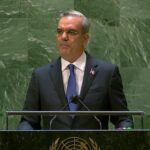The US State Department has expressed its concern about the Dominican government’s decision to completely close its land, sea and air borders with Haiti.
On September 15, Dominican President Luis Abinader decided to completely close all border points with Haiti. The decision was taken in protest at the initiative of the inhabitants of Ouanaminthe to build an irrigation canal on the Massacre river, which crosses the island’s two territories.
“We are following with great concern the announcement made by the government of the Dominican Republic to close all land, sea and air crossings between Haiti and the Dominican Republic, as of 6 a.m. Eastern time on September 15,” said a spokesman for the U.S. Department of State contacted by CaribbeanTelevisionNetwork. According to the US official, “the border closure is exacerbating the humanitarian crisis in Haiti. It also has a negative impact on local economies and security in the Dominican Republic and Haiti.”
The U.S. State Department calls on authorities in both countries “to urgently find a solution to this problem.”
Last week, the Dominican government decided to escalate the situation by dispatching military personnel and heavy equipment to the northern border. A decision criticized even in the Dominican Republic by several opposition parties and civil society organizations. Some are calling it a violation of international conventions and treaties, given that Haiti has no military force of its own.
The Massacre River, which crosses the two countries, has always been the subject of discussions between the Dominican and Haitian governments. A treaty was signed between Haiti and the Dominican Republic to demarcate the border and set the terms and conditions for the use of the waters of the Massacre River. According to this treaty, neither country should take any action to change the trajectory of the river’s water.
Since the signing of this agreement, the Dominicans have already built 11 dams and canals on the river, compared with zero for Haiti.
The treaty also stipulates that both countries have the full right to make responsible use of the river’s waters.
The Massacre River is one of the pillars of agriculture in the Dominican Republic, and Haiti is considered to be the second most important market after the United States.
Dominican farmers had crossed the border to support the movement of Ouanaminthe residents who had resumed the canal construction work initiated by former president Jovenel Moïse.
If completed, the canal would be the first built by Haiti since the agreement was signed in February 1929 under the administration of Haitian President Stenio Vincent.
But the Dominican president intends to do everything in his power to thwart the project, while the Haitian government’s reaction is not considered firm enough. This has not prevented the inhabitants of the North-East from continuing the work against all odds. Citizens from other departments have also joined the brave residents of Ouanaminthe and the surrounding area.
https://history.state.gov/historicaldocuments/frus1931v01/d643







